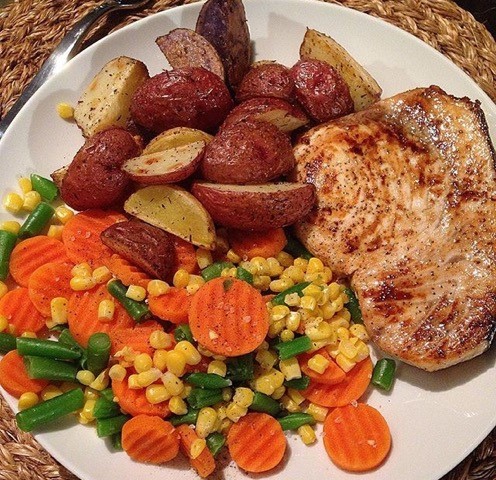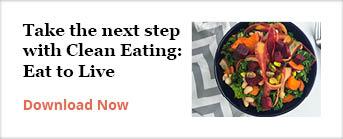Calories in vs Calories Out: What’s Actually Going on Here?

If you've been thinking of food as nutrient dense vs nutrient empty and high/low calorie instead of simply categorizing food as being healthy/unhealthy or good/bad like I discussed in my last post, you know there is a time and place for all types of food. Yes, that means even highly caloric, nutrient empty foods depending on context, or in the case of health and nutrition, your individual goals. To take this a step further, your goals (fat loss, strength gain, athletic competition preparation, etc.) will dictate how much energy you should be taking in (calories), and where that energy is coming from (what amounts of proteins, carbs, and fats to be consuming). To understand how that works, you'll need a short science lesson on calories and total energy balance in the body.

Newton’s first law of thermodynamics states that energy can be transferred from one form to another, but that it cannot be created nor destroyed. What does physics have to do with nutrition? Pretty much everything - in fact, most people have a misunderstanding of what a calorie actually is. A calorie is not really a physical thing you consume, it's actually a unit of energy. 1 calorie is a measurement of the amount of heat required to raise one gram of water by 1 degree Celsius. 1 kilocalorie is the amount of heat required to raise one kilogram of water by 1 degree Celsius. Which brings me to another point, whenever we use the word “calorie” we are actually referring to kilocalories (kCals), usually indicated by Calories with a capital C. For the sake of readability, I will continue to refer to kCals as calories, just know the difference.
All the energy content of a food is derived from its makeup of proteins, carbs, and fats. These are what are referred to as macronutrients, and your body breaks each of these nutrients down to send to different metabolic pathways (chemical reactions) for either energy use or energy storage. Each gram of protein and carbs provide the body with 4 calories, and each gram of fat provides it with 9 calories. So, if we want to lose weight, we have to be in an energy deficit - we need to be doing enough activity that we are expending more energy than we are consuming. This can get very confusing, as our bodies are expending energy in a multitude of ways.
Energy output from our bodies is divided into two main types: exercise activity and resting metabolic rate (RMR). Most of our energy expenditure comes from our RMR which includes our basal metabolic rate (BMR), non exercise activity thermogenesis (NEAT), and the thermic effect of feeding (TEF). Basal metabolic rate is the amount of energy required to simply keep us alive - energy required to run our organs (think of someone in a comatose state). Non exercise activity thermogenesis includes all the physical activity we do that aren't planned exercise - walking to work, standing at a desk, brushing your teeth, fidgeting, etc. As you can see, two people with similar body types could have vastly different resting metabolisms based on their lifestyle and genetics. To top all this off, metabolism is adaptive - it can increase or decrease in times of surplus or famine (an entirely other subject that I can cover in a later post). The last one that ties right into our nutrition discussion is the thermic effect of feeding.
TEF is literally the amount of energy we need to expend to digest the food we eat. All different food requires different amounts of energy to break down, but there is a widely accepted range for each macronutrient. Fat requires the least, using about 0-5% of its calorie for digestions, where as carbs fall in the 2-10% range, and protein is far and away the winner with a thermic effect of between 20-30%. This means that if if you had 100 calories of fat, you’d only use 0-5 calories to digest it, but if you had 100 calories of protein, you’d be using 20-30 calories. This is one of the many big reasons I recommend high protein diets to all my clients trying to lose weight - not only are these foods usually the most filling, you’ll literally burn more calories digesting them then you would with an equal amount of calories coming in from carbs and/or fats.
Now that you have a better understanding of energy balance in the body, let's tie this into some practical application. For anyone looking to lose weight, we want to be in somewhat of a caloric deficit. We don’t want to suddenly chop our calories in half, as that will create instant weight loss but you will soon plateau when your body enters starvation mode and your metabolism slows down. There is no biological reason our body would want to keep our metabolic rate constant if we are in danger of starving. Like I said before, it's really hard to figure out exactly how many calories you’re expending through rest and exercise and the numbers can fluctuate based on lots of factors, so there are really two way to do this. The first and less accurate way is to just be mindful of what you are eating over a week or two and take some notes about portion sizes and amount of protein you are consuming per day. Do not change any habits at this point as we are just establishing a baseline. After the test period, simply slightly reduce your food intake as well as add in a little additional protein. This could be as simple as getting rid of the afternoon snack that you don't really need, taking a little bit of oil off your foods, or replacing your breakfast cereal with a protein and fruit smoothie. These little changes add up, and after several weeks/months you will probably start to notice clothes fitting better.
The other way to do this is much more precise but will take a bit more effort. Instead of just being mindful of a couple weeks of eating, I recommend downloading a nutrition tracking app and logging your food for a few weeks (as accurately as possible). My personal favorite app for this is My Macros +, but My Fitness Pal is fine too. On day 1 when you start tracking, weigh yourself first thing in the morning, and on the same day each week weight yourself again. After about two weeks of data you can look back and figure out your daily caloric average, your daily protein average, and see if you've gained or lost weight. If your weight has stayed about the same, you’ve probably settled into eating for maintenance, whereas if you’ve gained weight you’re probably above maintenance, and if you’ve lost weight you’re probably below maintenance. As for protein, the BARE MINIMUM you should be consuming is .8g/kg of body weight (or .37g/lb of body weight). If you are active and/or trying to lose weight, that number should be much higher. Approximately 1 gram of protein per pound of bodyweight is a number that has been thrown around a lot, and while (unless you are a bodybuilder in a big caloric deficit trying to hold on to as much muscle as possible) you don’t NEED that much protein, I still recommend to most people that you shoot for .7-1.0 grams per pound simply because it will fill you up more, it will leave room for error if you fall short, and you’ll end up burning more calories digesting those extra grams than you would had they come from carbs or fat.
Now that you have a grocery list and and a better understanding of energy balance in the body, please feel free to comment with suggestions on what you would like to see from this article series. I can talk more about eating for different forms of exercise, more about how our body expends energy through different types of exercise, or actual recipes for dishes like protein pancakes. I want to hear from you, so let me know what information you're seeking in the comments.
In the meantime, download The Chopping Block's Clean Eating: Eat to Live guide. Whether you are trying to make some healthier changes or are already a kale-obsessed, green smoothie lover, you’ll find some actionable information inside this guide that will help you bring more vitality, energy, and fun into your kitchen and life.

